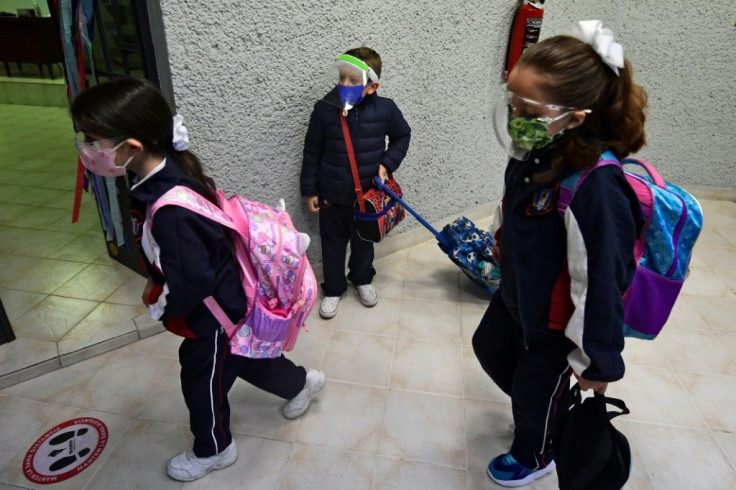Mexican Classrooms Reopen Amid Covid Third Wave
Millions of Mexican schoolchildren began returning to classrooms on Monday after more than a year of distance learning, despite another wave of Covid-19 infections sweeping the country.
The government said that the return would be "voluntary and safe," but some parents and opponents of President Andres Manuel Lopez Obrador worry that it is too soon.
Anna Alvarez, one of an estimated 25 million students who were expected to go back to classrooms, said she was "nervous and excited" after 17 months of studying at home.
"I was happy because I was with my family, but sad because I missed my friends," the eight-year-old said.
The children in her school in Mexico City wore face masks and teachers checked their temperatures and gave out antibacterial gel at the entrance.
Inside the classrooms, which had a maximum of six students at a time, the desks were surrounded by plastic covers and spaced further apart than usual.
The government ruled out forcing children to return to classrooms and said it would adopt a hybrid model with both face-to-face and distance learning.
"It's the mothers, the fathers and the children who have to make the decision. School is irreplaceable," Lopez Obrador said at his daily news conference.

Israel Garcia, 45, who brought his 11-year-old daughter Regina to school, said he was "a bit uncertain and afraid of how this scheme is going to work."
Mexico has an official coronavirus death toll of more than 258,000 -- one of the highest in the world -- and the country of 126 million is facing a third wave of infections.
It is the first time since the pandemic began that classrooms are reopening on a nationwide basis, although the return was delayed in a handful of Mexico's 32 states due to a tropical storm and rising coronavirus infections.
An earlier attempt to reopen classrooms in some regions in June was foiled by a number of outbreaks of Covid-19.
Mexican classrooms closed in March 2020 at the start of the pandemic, and more than 30 million students were sent home to take classes via television, the internet and radio.
That posed a challenge to teachers as well as disadvantaged families with no TV or internet.
"Working remotely has made us change the way we teach," said head teacher Lorena Reyna.
"It's been very complicated," she said.
© Copyright AFP 2024. All rights reserved.











